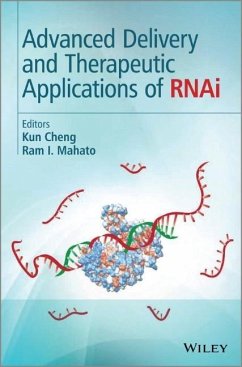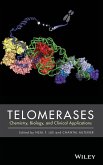Advanced Delivery and Therapeutic Applications of Rnai
Herausgeber: Cheng, Kun; Mahato, Ram I
Advanced Delivery and Therapeutic Applications of Rnai
Herausgeber: Cheng, Kun; Mahato, Ram I
- Gebundenes Buch
- Merkliste
- Auf die Merkliste
- Bewerten Bewerten
- Teilen
- Produkt teilen
- Produkterinnerung
- Produkterinnerung
Commonly used by researchers to develop technologies for modifying and studying genetic process, RNA interference (RNAi) has many potential uses in medicine, biotechnology, and functional genomics. This book covers all essential aspects involved in the development of RNAi therapeutics, providing detailed guidance on the challenges and opportunities of bringing RNAi technologies from bench to clinic. It explores the design and mechanism of RNAi molecules, delivery strategies, and therapeutic applications in various diseases. Preclinical, regulatory, market, and intellectual aspects of RNAi…mehr
Andere Kunden interessierten sich auch für
![Essentials of Carbohydrate Chemistry and Biochemistry Essentials of Carbohydrate Chemistry and Biochemistry]() Thisbe K. LindhorstEssentials of Carbohydrate Chemistry and Biochemistry69,99 €
Thisbe K. LindhorstEssentials of Carbohydrate Chemistry and Biochemistry69,99 €![Peptidomimetics in Organic and Medicinal Chemistry Peptidomimetics in Organic and Medicinal Chemistry]() Antonio GuarnaPeptidomimetics in Organic and Medicinal Chemistry197,99 €
Antonio GuarnaPeptidomimetics in Organic and Medicinal Chemistry197,99 €![Zuckersüße Chemie Zuckersüße Chemie]() Georg SchwedtZuckersüße Chemie31,90 €
Georg SchwedtZuckersüße Chemie31,90 €![Introduction to Proteomics Introduction to Proteomics]() Nawin C. MishraIntroduction to Proteomics140,99 €
Nawin C. MishraIntroduction to Proteomics140,99 €![Lysophospholipid Receptors Lysophospholipid Receptors]() Jerold ChunLysophospholipid Receptors191,99 €
Jerold ChunLysophospholipid Receptors191,99 €![Mirror-Image Asymmetry Mirror-Image Asymmetry]() James P RiehlMirror-Image Asymmetry76,99 €
James P RiehlMirror-Image Asymmetry76,99 €![Telomerases Telomerases]() Neal LueTelomerases165,99 €
Neal LueTelomerases165,99 €-
-
-
Commonly used by researchers to develop technologies for modifying and studying genetic process, RNA interference (RNAi) has many potential uses in medicine, biotechnology, and functional genomics. This book covers all essential aspects involved in the development of RNAi therapeutics, providing detailed guidance on the challenges and opportunities of bringing RNAi technologies from bench to clinic. It explores the design and mechanism of RNAi molecules, delivery strategies, and therapeutic applications in various diseases. Preclinical, regulatory, market, and intellectual aspects of RNAi technologies are also covered.
RNA interference (RNAi) is a process in living cells whereby small double stranded RNA interferes with the expression of specific genes with complementary nucleotide sequence. Like many nucleic acid-based therapies, RNAi has great potential in treating various life-threatening diseases. However, the poor stability and cellular uptake of RNAi molecules remain considerable barriers to their efficient delivery which is paramount to a successful therapy. This book provides a comprehensive introduction to RNAi delivery, then goes on to discuss different delivery strategies, and concludes with current applications in various diseases. It covers: * Mechanisms, Barriers, and Analysis of RNAi Delivery * Nonclinical Safety Assessments and Clinical Pharmacokinetics: A Regulatory Perspective * Bioconjugation of siRNA for Site Specifi c Delivery * Nanoscale Delivery Systems for RNAi * Environmentally-Responsive Delivery Systems for RNAi * Light-sensitive RNAi * Viral-Mediated Delivery of shRNA and miRNA * RNAi applications in Cancer Therapy, Liver Diseases, Hepatitis B, and Ocular Disease * miRNA as therapeutic agents and targets Advanced Delivery and Therapeutic Applications of RNAi combines the essential aspects of developing RNAi therapeutics from bench to clinic, and is invaluable for researchers working on RNAi, drug discovery and delivery, biomedical engineering, biomaterials, molecular biology, and biotechnology.
Hinweis: Dieser Artikel kann nur an eine deutsche Lieferadresse ausgeliefert werden.
RNA interference (RNAi) is a process in living cells whereby small double stranded RNA interferes with the expression of specific genes with complementary nucleotide sequence. Like many nucleic acid-based therapies, RNAi has great potential in treating various life-threatening diseases. However, the poor stability and cellular uptake of RNAi molecules remain considerable barriers to their efficient delivery which is paramount to a successful therapy. This book provides a comprehensive introduction to RNAi delivery, then goes on to discuss different delivery strategies, and concludes with current applications in various diseases. It covers: * Mechanisms, Barriers, and Analysis of RNAi Delivery * Nonclinical Safety Assessments and Clinical Pharmacokinetics: A Regulatory Perspective * Bioconjugation of siRNA for Site Specifi c Delivery * Nanoscale Delivery Systems for RNAi * Environmentally-Responsive Delivery Systems for RNAi * Light-sensitive RNAi * Viral-Mediated Delivery of shRNA and miRNA * RNAi applications in Cancer Therapy, Liver Diseases, Hepatitis B, and Ocular Disease * miRNA as therapeutic agents and targets Advanced Delivery and Therapeutic Applications of RNAi combines the essential aspects of developing RNAi therapeutics from bench to clinic, and is invaluable for researchers working on RNAi, drug discovery and delivery, biomedical engineering, biomaterials, molecular biology, and biotechnology.
Hinweis: Dieser Artikel kann nur an eine deutsche Lieferadresse ausgeliefert werden.
Produktdetails
- Produktdetails
- Verlag: John Wiley & Sons / Wiley
- Seitenzahl: 536
- Erscheinungstermin: 4. Juni 2013
- Englisch
- Abmessung: 252mm x 175mm x 30mm
- Gewicht: 980g
- ISBN-13: 9781119976868
- ISBN-10: 1119976863
- Artikelnr.: 38600089
- Herstellerkennzeichnung
- Libri GmbH
- Europaallee 1
- 36244 Bad Hersfeld
- 06621 890
- Verlag: John Wiley & Sons / Wiley
- Seitenzahl: 536
- Erscheinungstermin: 4. Juni 2013
- Englisch
- Abmessung: 252mm x 175mm x 30mm
- Gewicht: 980g
- ISBN-13: 9781119976868
- ISBN-10: 1119976863
- Artikelnr.: 38600089
- Herstellerkennzeichnung
- Libri GmbH
- Europaallee 1
- 36244 Bad Hersfeld
- 06621 890
Professor Kun Cheng, Division of Pharmaceutical Sciences, School of Pharmacy, University of Missouri-Kansas City, USA Professor Cheng's research interests include the delivery and therapeutic applications of RNAi for breast cancer, prostate cancer, liver diseases, and type I diabetes. He has been working in the area of nucleic acids since 2002. He is co-editor of Advanced Drug Delivery with Dr. Ashim Mitra and Dr. Chi Lee (Wiley, 2012). He has also co-edited a themed issue entitled "siRNA Delivery" with Dr. Ram Mahato for the journal Molecular Pharmaceutics, and has developed and taught a graduate course entitled "Protein and Nucleic Acid Drug Delivery". Professor Ram I. Mahato, Department of Pharmaceutical Sciences, School of Pharmacy, University of Tennessee Health Science Center, USA Professor Mahato is a full professor of Pharmaceutics and Drug/Gene Delivery at the University of Tennessee Health Science Center Memphis. He is the author or co-author of 85 peer reviewed articles and book chapters. He has also edited/written five books and six special journal issues. He is a Special Features Editor of Pharmaceutical Research and on the editorial board of several journals. His research interest includes delivery and targeting of small molecules, oligonucleotides, siRNA and genes.
Preface xvii
Contributors xix
About the Editors xxiii
Part 1 Introduction and Basics of RNAi 1
1 Mechanisms and Barriers to RNAi Delivery 3
Jiehua Zhou and John J. Rossi
1.1 Introduction 3
1.2 Barriers to Systemic RNAi Delivery 5
1.3 Rational Design to Improve RNAi Efficacy 6
1.4 Chemical Modifications to Enhance siRNA Stability and Reduce Immune
Response 7
1.5 Cellular Uptake and Intracellular Release of siRNA 7
1.6 Combinatorial Targeting for Targeted RNAi Delivery 8
1.7 Cell-Specific Aptamer-Functionalized Nanocarriers for RNAi Delivery 9
1.8 The Clinical Development and Challenges of siRNAs Therapeutics 10
1.9 Conclusion and Perspectives 12
References 12
2 Analysis of siRNA Delivery Using Various Methodologies 19
Yi Pei
2.1 Introduction 19
2.2 Checkpoints for Analyzing siRNA Delivery 20
2.3 Methods for Analysis of siRNA 26
2.4 Case Study for siRNA Delivery Analysis 38
References 39
3 Challenges and Opportunities in Bringing RNAi Technologies from Bench to
Bed 45
Sandesh Subramanya and Lance Ford
3.1 Introduction 45
3.2 RNAi Mediator (siRNA or shRNA) 45
3.3 Safety Issues of RNAi Mediators 50
3.4 Efficacy of RNAi Mediators 52
3.5 RNAi Mediators in Clinical Trials 53
3.6 Conclusion 54
References 55
Nonclinical Safety Assessments and Clinical Pharmacokinetics for
Oligonucleotide Therapeutics: A Regulatory Perspective 63
Shwu-Luan Lee, Paul Brown, Jian Wang and Robert T. Dorsam
4.1 Introduction 63
4.2 Unique Properties of Oligonucleotide-based Therapeutics 63
4.3 Regulation of Oligonucleotide-Based Therapeutics 65
4.4 Conclusion 79
Disclaimer 79
Appendix 79
References 80
Role of Promoters and MicroRNA Backbone for Efficient Gene Silencing 83
Feng Li and Ram I. Mahato
5.1 Introduction 83
5.2 Promoters for shRNA Expression 84
5.3 miRNA-based shRNAs 96
5.4 Concluding Remarks 100 References 101
Part 2 RNAi Delivery Strategies 109
6 Bioconjugation of siRNA for Site-specific Delivery 111
Bin Qin, Wei Jin and Kun Cheng
6.1 Introduction 111
6.2 Conjugation Strategy 112
6.3 Bioconjugates for Site-specific Delivery 120
6.4 Conclusion 129
References 129
7 Multifunctional RNAi Delivery Systems 137
China Malakondaiah Kummitha, Anthony S. Malamas and Zheng-Rong Lu
7.1 Introduction 137 7.1.1 Chapter Objectives 139
7.2 Lipid-Based Delivery Systems 139
7.3 Polymeric Multifunctional siRNA Delivery Systems 150
7.4 Conclusion 157
References 157
8 Dendrimers in RNAi Delivery 163
Jose Luis Jimenez Fuentes, Paula Ortega, Sara Ferrando-Martýnez, Rafael
Gomez, Manuel Leal, Javier de la Mata and MaAngeles Munoz-Fernandez
8.1 Introduction 163
8.2 Challenges in RNAi Delivery 164
8.3 Dendrimers as Non Viral Vectors 166
9 Development of Pharmaceutically Adapted Mesoporous Silica Nanoparticles
for siRNA Delivery 187
Wilson X. Mai, Tian Xia and Huan Meng
9.1 Introduction 187
9.2 Mesoporous Silica Nanoparticles as Novel Inorganic Nanocarriers for
siRNA Delivery 188
9.3 Safety Assessment of Nanocarrier and Design of Safe MSNP Carrier 199
References 179
9.4 Summary References 202
10 Environmentally-Responsive Nanogels for siRNA Delivery 207
Atsushi Tamura and Yukio Nagasaki
10.1 Introduction 207
10.2 Reductive Environment-Responsive Disulfide Crosslinked Nanogels 209
10.3 Temperature-Responsive Nanogels 211
10.4 pH-Responsive Nanogels 212
10.5 PEGylated and Partially Quaternized Polyamine Nanogels 216
10.6 Conclusions 220
References 220
11 Viral-Mediated Delivery of shRNA and miRNA 225
Fredric P. Manfredsson
11.1 Introduction 225
11.2 RNAi - A Brief Overview 226
11.3 shRNA or miRNA? 226
11.4 Rational Design 227
11.5 Viral Vectors 227
11.6 Tissue-specific Transduction 233
11.7 Applications of Virally Expressed shRNAs 241
11.8 Viral Gene Therapy in the Clinic 241
11.9 Conclusion 242
References 242
12 The Control of RNA Interference with Light 255
Simon H. Friedman
12.1 Introduction 255 12.2 The Importance of Gene Expression 255
12.3 Light Control of Gene Expression 257
12.4 Why Use RNA Interference as a Basis for Light Control of Gene
Expression? 258
12.5 Light Activated RNA Interference (LARI), the work of Friedman and
Co-Workers 259
12.6 Work of McMaster and Co-Workers, 50 Antisense Phosphate Block 262
12.7 Work of Heckel and Co-Workers, Nucleobase Block 263
12.8 Use of 20 FsiRNA, work of Monroe and Co-Workers 264
12.9 Photochemical Internalization 265
12.10 Future Directions and Conclusions 266
Acknowledgments 267
References 267
Part 3 Applications of RNAi in Various Diseases 269
13 RNAi in Cancer Therapy 271
Cristian Rodriguez-Aguayo, Arturo Chavez-Reyes, Gabriel Lopez-Berestein and
Anil K. Sood
13.1 Introduction 271
13.2 Therapeutic Opportunities for Noncoding RNAs 274
13.3 RNAs as Drugs 277
13.4 Overcoming Anatomical and Physiologic Barriers 278
13.5 Advanced Delivery 283
13.6 Clinical Experience 294
13.7 The Next Steps 298
Acknowledgments 298
References 298
14 Adenovirus-mediated siRNA Delivery to Cancer 309
Chae-Ok Yun
14.1 Introduction 309
14.2 shRNA-expressing Adenoviruses: Cancer Biological Studies and
Therapeutic Implications 312
14.3 Exploiting Oncolytic Adenovirus for siRNA Expression 315
14.4 Current Limitations of Adenovirus-mediated siRNA Therapy and Future
Directions: Smart Adenovirus Nanocomplexes Expressing siRNA for Systemic
Administration 318
14.5 Conclusion 320
References 321
15 RNAi in Liver Diseases 327
Jiang Li, Jianqin Lu, Yifei Zhang, Mohammed Ghazwani, Peng Zhang, Xiang Gao
and Song Li
15.1 Introduction 327
15.2 RNAi in Viral Hepatitis 327
15.3 RNAi in Hepatocellular Carcinoma 336
15.4 RNAi in Liver Fibrosis 340
15.5 Delivery Systems in RNAi 345
15.6 Conclusion 352
Acknowledgments 353
References 353
16 Approaches to Delivering RNAi Therapeutics that Target Hepatitis B Virus
367
Carol Crowther, Mohube Betty Mowa, Abdullah Ely and Patrick Arbuthnot
16.1 Introduction 367
16.2 Vectors Suitable for Hepatic Delivery of HBV Gene Silencers 369
16.3 Conclusions 381
Acknowledgments 382
References 382
17 RNAi in Respiratory Diseases 391
Ciara Kelly, Awadh B. Yadav, Paul J. McKiernan, Catherine M. Greene and
Sally-Ann Cryan
17.1 Introduction 391
17.2 Respiratory Disease and RNA Interference 392
17.3 Delivery and Development of RNAi Therapies for Respiratory Disease 397
17.4 Conclusions 408
Acknowledgements 408 References 408
18 RNAi in Ocular Diseases 417
Andrey Turchinovich, Georg Zoidl and Rolf Dermietzel
18.1 Introduction 417
18.2 The Principle of RNAi 418
18.3 In vivo Delivery of siRNA 419
18.4 Delivery of siRNA into the Eye 420
18.5 Conclusions 431
Abbreviations 432
References 432
19 micro RNAs as Therapeutic Agents and Targets 439
D.S. Karolina and K. Jeyaseelan
19.1 Introduction 439
19.2 miRNA Therapeutics 440
19.3 MicroRNAs and Cancer 447
19.4 MicroRNAs in Stroke 450
19.5 MicroRNAs in Heart Diseases 452
19.6 MicroRNAs in Diabetes Mellitus 454
19.7 MicroRNAs in Liver Diseases 457
19.8 MicroRNAs and Ocular Diseases 461
19.9 MicroRNAs and Respiratory Diseases 462
19.10 MicroRNAs and Stem Cell Research 465
19.11 Conclusion 468
References 469
20 Delivery of Micro RNA Sponges for Interrogation of MicroRNA Function In
Vitro and In Vivo 483
Jiakai Lin and Shu Wang
20.1 MicroRNA Loss-of-Function Studies 483
20.2 Considerations in MicroRNA Sponge Design 486
20.3 Advantages and Limitations of MicroRNA Sponge over Other MicroRNA
Loss-of-Function Strategies 489
20.4 Interrogating MicroRNA Function via Transient MicroRNA Sponge
Expression 493
20.5 Interrogating MicroRNA Function via Stable MicroRNA Sponge Expression
494
20.6 Utility of MicroRNA Sponge in Living Organisms 496
20.7 Future Perspectives 498
References 499
Index 505
Contributors xix
About the Editors xxiii
Part 1 Introduction and Basics of RNAi 1
1 Mechanisms and Barriers to RNAi Delivery 3
Jiehua Zhou and John J. Rossi
1.1 Introduction 3
1.2 Barriers to Systemic RNAi Delivery 5
1.3 Rational Design to Improve RNAi Efficacy 6
1.4 Chemical Modifications to Enhance siRNA Stability and Reduce Immune
Response 7
1.5 Cellular Uptake and Intracellular Release of siRNA 7
1.6 Combinatorial Targeting for Targeted RNAi Delivery 8
1.7 Cell-Specific Aptamer-Functionalized Nanocarriers for RNAi Delivery 9
1.8 The Clinical Development and Challenges of siRNAs Therapeutics 10
1.9 Conclusion and Perspectives 12
References 12
2 Analysis of siRNA Delivery Using Various Methodologies 19
Yi Pei
2.1 Introduction 19
2.2 Checkpoints for Analyzing siRNA Delivery 20
2.3 Methods for Analysis of siRNA 26
2.4 Case Study for siRNA Delivery Analysis 38
References 39
3 Challenges and Opportunities in Bringing RNAi Technologies from Bench to
Bed 45
Sandesh Subramanya and Lance Ford
3.1 Introduction 45
3.2 RNAi Mediator (siRNA or shRNA) 45
3.3 Safety Issues of RNAi Mediators 50
3.4 Efficacy of RNAi Mediators 52
3.5 RNAi Mediators in Clinical Trials 53
3.6 Conclusion 54
References 55
Nonclinical Safety Assessments and Clinical Pharmacokinetics for
Oligonucleotide Therapeutics: A Regulatory Perspective 63
Shwu-Luan Lee, Paul Brown, Jian Wang and Robert T. Dorsam
4.1 Introduction 63
4.2 Unique Properties of Oligonucleotide-based Therapeutics 63
4.3 Regulation of Oligonucleotide-Based Therapeutics 65
4.4 Conclusion 79
Disclaimer 79
Appendix 79
References 80
Role of Promoters and MicroRNA Backbone for Efficient Gene Silencing 83
Feng Li and Ram I. Mahato
5.1 Introduction 83
5.2 Promoters for shRNA Expression 84
5.3 miRNA-based shRNAs 96
5.4 Concluding Remarks 100 References 101
Part 2 RNAi Delivery Strategies 109
6 Bioconjugation of siRNA for Site-specific Delivery 111
Bin Qin, Wei Jin and Kun Cheng
6.1 Introduction 111
6.2 Conjugation Strategy 112
6.3 Bioconjugates for Site-specific Delivery 120
6.4 Conclusion 129
References 129
7 Multifunctional RNAi Delivery Systems 137
China Malakondaiah Kummitha, Anthony S. Malamas and Zheng-Rong Lu
7.1 Introduction 137 7.1.1 Chapter Objectives 139
7.2 Lipid-Based Delivery Systems 139
7.3 Polymeric Multifunctional siRNA Delivery Systems 150
7.4 Conclusion 157
References 157
8 Dendrimers in RNAi Delivery 163
Jose Luis Jimenez Fuentes, Paula Ortega, Sara Ferrando-Martýnez, Rafael
Gomez, Manuel Leal, Javier de la Mata and MaAngeles Munoz-Fernandez
8.1 Introduction 163
8.2 Challenges in RNAi Delivery 164
8.3 Dendrimers as Non Viral Vectors 166
9 Development of Pharmaceutically Adapted Mesoporous Silica Nanoparticles
for siRNA Delivery 187
Wilson X. Mai, Tian Xia and Huan Meng
9.1 Introduction 187
9.2 Mesoporous Silica Nanoparticles as Novel Inorganic Nanocarriers for
siRNA Delivery 188
9.3 Safety Assessment of Nanocarrier and Design of Safe MSNP Carrier 199
References 179
9.4 Summary References 202
10 Environmentally-Responsive Nanogels for siRNA Delivery 207
Atsushi Tamura and Yukio Nagasaki
10.1 Introduction 207
10.2 Reductive Environment-Responsive Disulfide Crosslinked Nanogels 209
10.3 Temperature-Responsive Nanogels 211
10.4 pH-Responsive Nanogels 212
10.5 PEGylated and Partially Quaternized Polyamine Nanogels 216
10.6 Conclusions 220
References 220
11 Viral-Mediated Delivery of shRNA and miRNA 225
Fredric P. Manfredsson
11.1 Introduction 225
11.2 RNAi - A Brief Overview 226
11.3 shRNA or miRNA? 226
11.4 Rational Design 227
11.5 Viral Vectors 227
11.6 Tissue-specific Transduction 233
11.7 Applications of Virally Expressed shRNAs 241
11.8 Viral Gene Therapy in the Clinic 241
11.9 Conclusion 242
References 242
12 The Control of RNA Interference with Light 255
Simon H. Friedman
12.1 Introduction 255 12.2 The Importance of Gene Expression 255
12.3 Light Control of Gene Expression 257
12.4 Why Use RNA Interference as a Basis for Light Control of Gene
Expression? 258
12.5 Light Activated RNA Interference (LARI), the work of Friedman and
Co-Workers 259
12.6 Work of McMaster and Co-Workers, 50 Antisense Phosphate Block 262
12.7 Work of Heckel and Co-Workers, Nucleobase Block 263
12.8 Use of 20 FsiRNA, work of Monroe and Co-Workers 264
12.9 Photochemical Internalization 265
12.10 Future Directions and Conclusions 266
Acknowledgments 267
References 267
Part 3 Applications of RNAi in Various Diseases 269
13 RNAi in Cancer Therapy 271
Cristian Rodriguez-Aguayo, Arturo Chavez-Reyes, Gabriel Lopez-Berestein and
Anil K. Sood
13.1 Introduction 271
13.2 Therapeutic Opportunities for Noncoding RNAs 274
13.3 RNAs as Drugs 277
13.4 Overcoming Anatomical and Physiologic Barriers 278
13.5 Advanced Delivery 283
13.6 Clinical Experience 294
13.7 The Next Steps 298
Acknowledgments 298
References 298
14 Adenovirus-mediated siRNA Delivery to Cancer 309
Chae-Ok Yun
14.1 Introduction 309
14.2 shRNA-expressing Adenoviruses: Cancer Biological Studies and
Therapeutic Implications 312
14.3 Exploiting Oncolytic Adenovirus for siRNA Expression 315
14.4 Current Limitations of Adenovirus-mediated siRNA Therapy and Future
Directions: Smart Adenovirus Nanocomplexes Expressing siRNA for Systemic
Administration 318
14.5 Conclusion 320
References 321
15 RNAi in Liver Diseases 327
Jiang Li, Jianqin Lu, Yifei Zhang, Mohammed Ghazwani, Peng Zhang, Xiang Gao
and Song Li
15.1 Introduction 327
15.2 RNAi in Viral Hepatitis 327
15.3 RNAi in Hepatocellular Carcinoma 336
15.4 RNAi in Liver Fibrosis 340
15.5 Delivery Systems in RNAi 345
15.6 Conclusion 352
Acknowledgments 353
References 353
16 Approaches to Delivering RNAi Therapeutics that Target Hepatitis B Virus
367
Carol Crowther, Mohube Betty Mowa, Abdullah Ely and Patrick Arbuthnot
16.1 Introduction 367
16.2 Vectors Suitable for Hepatic Delivery of HBV Gene Silencers 369
16.3 Conclusions 381
Acknowledgments 382
References 382
17 RNAi in Respiratory Diseases 391
Ciara Kelly, Awadh B. Yadav, Paul J. McKiernan, Catherine M. Greene and
Sally-Ann Cryan
17.1 Introduction 391
17.2 Respiratory Disease and RNA Interference 392
17.3 Delivery and Development of RNAi Therapies for Respiratory Disease 397
17.4 Conclusions 408
Acknowledgements 408 References 408
18 RNAi in Ocular Diseases 417
Andrey Turchinovich, Georg Zoidl and Rolf Dermietzel
18.1 Introduction 417
18.2 The Principle of RNAi 418
18.3 In vivo Delivery of siRNA 419
18.4 Delivery of siRNA into the Eye 420
18.5 Conclusions 431
Abbreviations 432
References 432
19 micro RNAs as Therapeutic Agents and Targets 439
D.S. Karolina and K. Jeyaseelan
19.1 Introduction 439
19.2 miRNA Therapeutics 440
19.3 MicroRNAs and Cancer 447
19.4 MicroRNAs in Stroke 450
19.5 MicroRNAs in Heart Diseases 452
19.6 MicroRNAs in Diabetes Mellitus 454
19.7 MicroRNAs in Liver Diseases 457
19.8 MicroRNAs and Ocular Diseases 461
19.9 MicroRNAs and Respiratory Diseases 462
19.10 MicroRNAs and Stem Cell Research 465
19.11 Conclusion 468
References 469
20 Delivery of Micro RNA Sponges for Interrogation of MicroRNA Function In
Vitro and In Vivo 483
Jiakai Lin and Shu Wang
20.1 MicroRNA Loss-of-Function Studies 483
20.2 Considerations in MicroRNA Sponge Design 486
20.3 Advantages and Limitations of MicroRNA Sponge over Other MicroRNA
Loss-of-Function Strategies 489
20.4 Interrogating MicroRNA Function via Transient MicroRNA Sponge
Expression 493
20.5 Interrogating MicroRNA Function via Stable MicroRNA Sponge Expression
494
20.6 Utility of MicroRNA Sponge in Living Organisms 496
20.7 Future Perspectives 498
References 499
Index 505
Preface xvii
Contributors xix
About the Editors xxiii
Part 1 Introduction and Basics of RNAi 1
1 Mechanisms and Barriers to RNAi Delivery 3
Jiehua Zhou and John J. Rossi
1.1 Introduction 3
1.2 Barriers to Systemic RNAi Delivery 5
1.3 Rational Design to Improve RNAi Efficacy 6
1.4 Chemical Modifications to Enhance siRNA Stability and Reduce Immune
Response 7
1.5 Cellular Uptake and Intracellular Release of siRNA 7
1.6 Combinatorial Targeting for Targeted RNAi Delivery 8
1.7 Cell-Specific Aptamer-Functionalized Nanocarriers for RNAi Delivery 9
1.8 The Clinical Development and Challenges of siRNAs Therapeutics 10
1.9 Conclusion and Perspectives 12
References 12
2 Analysis of siRNA Delivery Using Various Methodologies 19
Yi Pei
2.1 Introduction 19
2.2 Checkpoints for Analyzing siRNA Delivery 20
2.3 Methods for Analysis of siRNA 26
2.4 Case Study for siRNA Delivery Analysis 38
References 39
3 Challenges and Opportunities in Bringing RNAi Technologies from Bench to
Bed 45
Sandesh Subramanya and Lance Ford
3.1 Introduction 45
3.2 RNAi Mediator (siRNA or shRNA) 45
3.3 Safety Issues of RNAi Mediators 50
3.4 Efficacy of RNAi Mediators 52
3.5 RNAi Mediators in Clinical Trials 53
3.6 Conclusion 54
References 55
Nonclinical Safety Assessments and Clinical Pharmacokinetics for
Oligonucleotide Therapeutics: A Regulatory Perspective 63
Shwu-Luan Lee, Paul Brown, Jian Wang and Robert T. Dorsam
4.1 Introduction 63
4.2 Unique Properties of Oligonucleotide-based Therapeutics 63
4.3 Regulation of Oligonucleotide-Based Therapeutics 65
4.4 Conclusion 79
Disclaimer 79
Appendix 79
References 80
Role of Promoters and MicroRNA Backbone for Efficient Gene Silencing 83
Feng Li and Ram I. Mahato
5.1 Introduction 83
5.2 Promoters for shRNA Expression 84
5.3 miRNA-based shRNAs 96
5.4 Concluding Remarks 100 References 101
Part 2 RNAi Delivery Strategies 109
6 Bioconjugation of siRNA for Site-specific Delivery 111
Bin Qin, Wei Jin and Kun Cheng
6.1 Introduction 111
6.2 Conjugation Strategy 112
6.3 Bioconjugates for Site-specific Delivery 120
6.4 Conclusion 129
References 129
7 Multifunctional RNAi Delivery Systems 137
China Malakondaiah Kummitha, Anthony S. Malamas and Zheng-Rong Lu
7.1 Introduction 137 7.1.1 Chapter Objectives 139
7.2 Lipid-Based Delivery Systems 139
7.3 Polymeric Multifunctional siRNA Delivery Systems 150
7.4 Conclusion 157
References 157
8 Dendrimers in RNAi Delivery 163
Jose Luis Jimenez Fuentes, Paula Ortega, Sara Ferrando-Martýnez, Rafael
Gomez, Manuel Leal, Javier de la Mata and MaAngeles Munoz-Fernandez
8.1 Introduction 163
8.2 Challenges in RNAi Delivery 164
8.3 Dendrimers as Non Viral Vectors 166
9 Development of Pharmaceutically Adapted Mesoporous Silica Nanoparticles
for siRNA Delivery 187
Wilson X. Mai, Tian Xia and Huan Meng
9.1 Introduction 187
9.2 Mesoporous Silica Nanoparticles as Novel Inorganic Nanocarriers for
siRNA Delivery 188
9.3 Safety Assessment of Nanocarrier and Design of Safe MSNP Carrier 199
References 179
9.4 Summary References 202
10 Environmentally-Responsive Nanogels for siRNA Delivery 207
Atsushi Tamura and Yukio Nagasaki
10.1 Introduction 207
10.2 Reductive Environment-Responsive Disulfide Crosslinked Nanogels 209
10.3 Temperature-Responsive Nanogels 211
10.4 pH-Responsive Nanogels 212
10.5 PEGylated and Partially Quaternized Polyamine Nanogels 216
10.6 Conclusions 220
References 220
11 Viral-Mediated Delivery of shRNA and miRNA 225
Fredric P. Manfredsson
11.1 Introduction 225
11.2 RNAi - A Brief Overview 226
11.3 shRNA or miRNA? 226
11.4 Rational Design 227
11.5 Viral Vectors 227
11.6 Tissue-specific Transduction 233
11.7 Applications of Virally Expressed shRNAs 241
11.8 Viral Gene Therapy in the Clinic 241
11.9 Conclusion 242
References 242
12 The Control of RNA Interference with Light 255
Simon H. Friedman
12.1 Introduction 255 12.2 The Importance of Gene Expression 255
12.3 Light Control of Gene Expression 257
12.4 Why Use RNA Interference as a Basis for Light Control of Gene
Expression? 258
12.5 Light Activated RNA Interference (LARI), the work of Friedman and
Co-Workers 259
12.6 Work of McMaster and Co-Workers, 50 Antisense Phosphate Block 262
12.7 Work of Heckel and Co-Workers, Nucleobase Block 263
12.8 Use of 20 FsiRNA, work of Monroe and Co-Workers 264
12.9 Photochemical Internalization 265
12.10 Future Directions and Conclusions 266
Acknowledgments 267
References 267
Part 3 Applications of RNAi in Various Diseases 269
13 RNAi in Cancer Therapy 271
Cristian Rodriguez-Aguayo, Arturo Chavez-Reyes, Gabriel Lopez-Berestein and
Anil K. Sood
13.1 Introduction 271
13.2 Therapeutic Opportunities for Noncoding RNAs 274
13.3 RNAs as Drugs 277
13.4 Overcoming Anatomical and Physiologic Barriers 278
13.5 Advanced Delivery 283
13.6 Clinical Experience 294
13.7 The Next Steps 298
Acknowledgments 298
References 298
14 Adenovirus-mediated siRNA Delivery to Cancer 309
Chae-Ok Yun
14.1 Introduction 309
14.2 shRNA-expressing Adenoviruses: Cancer Biological Studies and
Therapeutic Implications 312
14.3 Exploiting Oncolytic Adenovirus for siRNA Expression 315
14.4 Current Limitations of Adenovirus-mediated siRNA Therapy and Future
Directions: Smart Adenovirus Nanocomplexes Expressing siRNA for Systemic
Administration 318
14.5 Conclusion 320
References 321
15 RNAi in Liver Diseases 327
Jiang Li, Jianqin Lu, Yifei Zhang, Mohammed Ghazwani, Peng Zhang, Xiang Gao
and Song Li
15.1 Introduction 327
15.2 RNAi in Viral Hepatitis 327
15.3 RNAi in Hepatocellular Carcinoma 336
15.4 RNAi in Liver Fibrosis 340
15.5 Delivery Systems in RNAi 345
15.6 Conclusion 352
Acknowledgments 353
References 353
16 Approaches to Delivering RNAi Therapeutics that Target Hepatitis B Virus
367
Carol Crowther, Mohube Betty Mowa, Abdullah Ely and Patrick Arbuthnot
16.1 Introduction 367
16.2 Vectors Suitable for Hepatic Delivery of HBV Gene Silencers 369
16.3 Conclusions 381
Acknowledgments 382
References 382
17 RNAi in Respiratory Diseases 391
Ciara Kelly, Awadh B. Yadav, Paul J. McKiernan, Catherine M. Greene and
Sally-Ann Cryan
17.1 Introduction 391
17.2 Respiratory Disease and RNA Interference 392
17.3 Delivery and Development of RNAi Therapies for Respiratory Disease 397
17.4 Conclusions 408
Acknowledgements 408 References 408
18 RNAi in Ocular Diseases 417
Andrey Turchinovich, Georg Zoidl and Rolf Dermietzel
18.1 Introduction 417
18.2 The Principle of RNAi 418
18.3 In vivo Delivery of siRNA 419
18.4 Delivery of siRNA into the Eye 420
18.5 Conclusions 431
Abbreviations 432
References 432
19 micro RNAs as Therapeutic Agents and Targets 439
D.S. Karolina and K. Jeyaseelan
19.1 Introduction 439
19.2 miRNA Therapeutics 440
19.3 MicroRNAs and Cancer 447
19.4 MicroRNAs in Stroke 450
19.5 MicroRNAs in Heart Diseases 452
19.6 MicroRNAs in Diabetes Mellitus 454
19.7 MicroRNAs in Liver Diseases 457
19.8 MicroRNAs and Ocular Diseases 461
19.9 MicroRNAs and Respiratory Diseases 462
19.10 MicroRNAs and Stem Cell Research 465
19.11 Conclusion 468
References 469
20 Delivery of Micro RNA Sponges for Interrogation of MicroRNA Function In
Vitro and In Vivo 483
Jiakai Lin and Shu Wang
20.1 MicroRNA Loss-of-Function Studies 483
20.2 Considerations in MicroRNA Sponge Design 486
20.3 Advantages and Limitations of MicroRNA Sponge over Other MicroRNA
Loss-of-Function Strategies 489
20.4 Interrogating MicroRNA Function via Transient MicroRNA Sponge
Expression 493
20.5 Interrogating MicroRNA Function via Stable MicroRNA Sponge Expression
494
20.6 Utility of MicroRNA Sponge in Living Organisms 496
20.7 Future Perspectives 498
References 499
Index 505
Contributors xix
About the Editors xxiii
Part 1 Introduction and Basics of RNAi 1
1 Mechanisms and Barriers to RNAi Delivery 3
Jiehua Zhou and John J. Rossi
1.1 Introduction 3
1.2 Barriers to Systemic RNAi Delivery 5
1.3 Rational Design to Improve RNAi Efficacy 6
1.4 Chemical Modifications to Enhance siRNA Stability and Reduce Immune
Response 7
1.5 Cellular Uptake and Intracellular Release of siRNA 7
1.6 Combinatorial Targeting for Targeted RNAi Delivery 8
1.7 Cell-Specific Aptamer-Functionalized Nanocarriers for RNAi Delivery 9
1.8 The Clinical Development and Challenges of siRNAs Therapeutics 10
1.9 Conclusion and Perspectives 12
References 12
2 Analysis of siRNA Delivery Using Various Methodologies 19
Yi Pei
2.1 Introduction 19
2.2 Checkpoints for Analyzing siRNA Delivery 20
2.3 Methods for Analysis of siRNA 26
2.4 Case Study for siRNA Delivery Analysis 38
References 39
3 Challenges and Opportunities in Bringing RNAi Technologies from Bench to
Bed 45
Sandesh Subramanya and Lance Ford
3.1 Introduction 45
3.2 RNAi Mediator (siRNA or shRNA) 45
3.3 Safety Issues of RNAi Mediators 50
3.4 Efficacy of RNAi Mediators 52
3.5 RNAi Mediators in Clinical Trials 53
3.6 Conclusion 54
References 55
Nonclinical Safety Assessments and Clinical Pharmacokinetics for
Oligonucleotide Therapeutics: A Regulatory Perspective 63
Shwu-Luan Lee, Paul Brown, Jian Wang and Robert T. Dorsam
4.1 Introduction 63
4.2 Unique Properties of Oligonucleotide-based Therapeutics 63
4.3 Regulation of Oligonucleotide-Based Therapeutics 65
4.4 Conclusion 79
Disclaimer 79
Appendix 79
References 80
Role of Promoters and MicroRNA Backbone for Efficient Gene Silencing 83
Feng Li and Ram I. Mahato
5.1 Introduction 83
5.2 Promoters for shRNA Expression 84
5.3 miRNA-based shRNAs 96
5.4 Concluding Remarks 100 References 101
Part 2 RNAi Delivery Strategies 109
6 Bioconjugation of siRNA for Site-specific Delivery 111
Bin Qin, Wei Jin and Kun Cheng
6.1 Introduction 111
6.2 Conjugation Strategy 112
6.3 Bioconjugates for Site-specific Delivery 120
6.4 Conclusion 129
References 129
7 Multifunctional RNAi Delivery Systems 137
China Malakondaiah Kummitha, Anthony S. Malamas and Zheng-Rong Lu
7.1 Introduction 137 7.1.1 Chapter Objectives 139
7.2 Lipid-Based Delivery Systems 139
7.3 Polymeric Multifunctional siRNA Delivery Systems 150
7.4 Conclusion 157
References 157
8 Dendrimers in RNAi Delivery 163
Jose Luis Jimenez Fuentes, Paula Ortega, Sara Ferrando-Martýnez, Rafael
Gomez, Manuel Leal, Javier de la Mata and MaAngeles Munoz-Fernandez
8.1 Introduction 163
8.2 Challenges in RNAi Delivery 164
8.3 Dendrimers as Non Viral Vectors 166
9 Development of Pharmaceutically Adapted Mesoporous Silica Nanoparticles
for siRNA Delivery 187
Wilson X. Mai, Tian Xia and Huan Meng
9.1 Introduction 187
9.2 Mesoporous Silica Nanoparticles as Novel Inorganic Nanocarriers for
siRNA Delivery 188
9.3 Safety Assessment of Nanocarrier and Design of Safe MSNP Carrier 199
References 179
9.4 Summary References 202
10 Environmentally-Responsive Nanogels for siRNA Delivery 207
Atsushi Tamura and Yukio Nagasaki
10.1 Introduction 207
10.2 Reductive Environment-Responsive Disulfide Crosslinked Nanogels 209
10.3 Temperature-Responsive Nanogels 211
10.4 pH-Responsive Nanogels 212
10.5 PEGylated and Partially Quaternized Polyamine Nanogels 216
10.6 Conclusions 220
References 220
11 Viral-Mediated Delivery of shRNA and miRNA 225
Fredric P. Manfredsson
11.1 Introduction 225
11.2 RNAi - A Brief Overview 226
11.3 shRNA or miRNA? 226
11.4 Rational Design 227
11.5 Viral Vectors 227
11.6 Tissue-specific Transduction 233
11.7 Applications of Virally Expressed shRNAs 241
11.8 Viral Gene Therapy in the Clinic 241
11.9 Conclusion 242
References 242
12 The Control of RNA Interference with Light 255
Simon H. Friedman
12.1 Introduction 255 12.2 The Importance of Gene Expression 255
12.3 Light Control of Gene Expression 257
12.4 Why Use RNA Interference as a Basis for Light Control of Gene
Expression? 258
12.5 Light Activated RNA Interference (LARI), the work of Friedman and
Co-Workers 259
12.6 Work of McMaster and Co-Workers, 50 Antisense Phosphate Block 262
12.7 Work of Heckel and Co-Workers, Nucleobase Block 263
12.8 Use of 20 FsiRNA, work of Monroe and Co-Workers 264
12.9 Photochemical Internalization 265
12.10 Future Directions and Conclusions 266
Acknowledgments 267
References 267
Part 3 Applications of RNAi in Various Diseases 269
13 RNAi in Cancer Therapy 271
Cristian Rodriguez-Aguayo, Arturo Chavez-Reyes, Gabriel Lopez-Berestein and
Anil K. Sood
13.1 Introduction 271
13.2 Therapeutic Opportunities for Noncoding RNAs 274
13.3 RNAs as Drugs 277
13.4 Overcoming Anatomical and Physiologic Barriers 278
13.5 Advanced Delivery 283
13.6 Clinical Experience 294
13.7 The Next Steps 298
Acknowledgments 298
References 298
14 Adenovirus-mediated siRNA Delivery to Cancer 309
Chae-Ok Yun
14.1 Introduction 309
14.2 shRNA-expressing Adenoviruses: Cancer Biological Studies and
Therapeutic Implications 312
14.3 Exploiting Oncolytic Adenovirus for siRNA Expression 315
14.4 Current Limitations of Adenovirus-mediated siRNA Therapy and Future
Directions: Smart Adenovirus Nanocomplexes Expressing siRNA for Systemic
Administration 318
14.5 Conclusion 320
References 321
15 RNAi in Liver Diseases 327
Jiang Li, Jianqin Lu, Yifei Zhang, Mohammed Ghazwani, Peng Zhang, Xiang Gao
and Song Li
15.1 Introduction 327
15.2 RNAi in Viral Hepatitis 327
15.3 RNAi in Hepatocellular Carcinoma 336
15.4 RNAi in Liver Fibrosis 340
15.5 Delivery Systems in RNAi 345
15.6 Conclusion 352
Acknowledgments 353
References 353
16 Approaches to Delivering RNAi Therapeutics that Target Hepatitis B Virus
367
Carol Crowther, Mohube Betty Mowa, Abdullah Ely and Patrick Arbuthnot
16.1 Introduction 367
16.2 Vectors Suitable for Hepatic Delivery of HBV Gene Silencers 369
16.3 Conclusions 381
Acknowledgments 382
References 382
17 RNAi in Respiratory Diseases 391
Ciara Kelly, Awadh B. Yadav, Paul J. McKiernan, Catherine M. Greene and
Sally-Ann Cryan
17.1 Introduction 391
17.2 Respiratory Disease and RNA Interference 392
17.3 Delivery and Development of RNAi Therapies for Respiratory Disease 397
17.4 Conclusions 408
Acknowledgements 408 References 408
18 RNAi in Ocular Diseases 417
Andrey Turchinovich, Georg Zoidl and Rolf Dermietzel
18.1 Introduction 417
18.2 The Principle of RNAi 418
18.3 In vivo Delivery of siRNA 419
18.4 Delivery of siRNA into the Eye 420
18.5 Conclusions 431
Abbreviations 432
References 432
19 micro RNAs as Therapeutic Agents and Targets 439
D.S. Karolina and K. Jeyaseelan
19.1 Introduction 439
19.2 miRNA Therapeutics 440
19.3 MicroRNAs and Cancer 447
19.4 MicroRNAs in Stroke 450
19.5 MicroRNAs in Heart Diseases 452
19.6 MicroRNAs in Diabetes Mellitus 454
19.7 MicroRNAs in Liver Diseases 457
19.8 MicroRNAs and Ocular Diseases 461
19.9 MicroRNAs and Respiratory Diseases 462
19.10 MicroRNAs and Stem Cell Research 465
19.11 Conclusion 468
References 469
20 Delivery of Micro RNA Sponges for Interrogation of MicroRNA Function In
Vitro and In Vivo 483
Jiakai Lin and Shu Wang
20.1 MicroRNA Loss-of-Function Studies 483
20.2 Considerations in MicroRNA Sponge Design 486
20.3 Advantages and Limitations of MicroRNA Sponge over Other MicroRNA
Loss-of-Function Strategies 489
20.4 Interrogating MicroRNA Function via Transient MicroRNA Sponge
Expression 493
20.5 Interrogating MicroRNA Function via Stable MicroRNA Sponge Expression
494
20.6 Utility of MicroRNA Sponge in Living Organisms 496
20.7 Future Perspectives 498
References 499
Index 505








